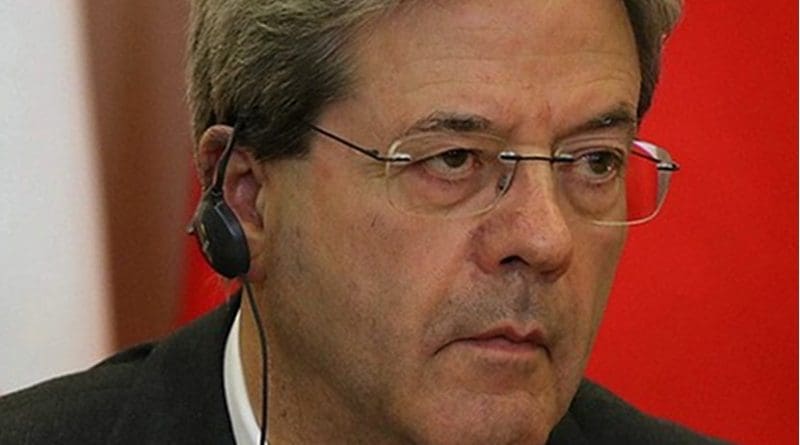Italian Political Paralysis Concern For Eurozone – OpEd
By Arab News
By Andrew Hammond*
Sunday’s stalemated Italian election saw no single party or wider bloc win an overall majority in parliament. The headlines have been captured by the populist Five Star Movement (M5S), an anti-establishment group that didn’t exist a decade ago. Exit polls indicate it has emerged as the largest single party after capitalizing on a rancorous campaign, in which immigration and the country’s economic woes have dominated.
However, M5S is well short of a working majority in the legislature and has previously pledged it won’t enter into a coalition with other parties, despite the similarities it has in some key areas with fellow Euroskeptic party The League, which also performed strongly on Sunday. If M5S reneges on its previous promise and these two populist parties do get together to try and form the next government, it would represent a potential worst case scenario for Brussels.
With talks on a new coalition to begin soon, in advance of the legislature reconvening on March 23, Sunday’s highly fragmented result also raises the specter of political paralysis in this key G7 nation, which has the third-largest economy in the eurozone. This is causing wider concern in Brussels and across European capitals because Italy is perhaps the biggest threat to the eurozone’s future.
The country has the second-biggest debt load in the single currency area at more than 130 percent of GDP, and its banking sector is under significant stress, with massive under-performing loans representing an estimated 135 percent of GDP. Any new coalition that emerges may well be weak, unstable and incapable of securing the structural reforms the country badly needs in 2018 and beyond.
While exit polls show M5S emerging as the largest single party, the largest bloc of parties is forecast to be the conservative one. This includes the party led by Silvio Berlusconi, representing a return to the political limelight for the controversial former prime minister, who cannot personally run for office because of a 2013 tax fraud conviction. He could now be well positioned to be a kingmaker in deciding the make-up of the next administration.
Polls last month had indicated this conservative bloc — which includes Berlusconi’s Forza Italia, The League (which may secure the most seats within the bloc) and the far-right Brothers of Italy — could have potentially secured a majority in the legislature. However, exit polls indicate this has not happened. Even had it won such a majority, this bloc would be a potentially very unstable coalition because of the tensions within it.
One of the key political flashpoints is over Europe and Brussels. The League’s Matteo Salvini, who could now become prime minister, especially if backed by M5S, asserts that he wishes to leave the EU and eurozone. Yet Berlusconi is more pro-European and he announced last week that his preferred candidate to be prime minister is Antonio Tajani, a Europhile who currently serves as European Parliament President.
Given the tensions between Berlusconi and Salvini, and the fact that exit polls indicate the bloc has not won a majority, these two political leaders could now potentially seek other deals. This includes the prospect of Salvini’s League and M5S entering into a courtship.
However, should M5S stick to its pre-election guns and not enter into a pact with other parties, another option for the country’s future governance is a grand coalition between one or more of the conservative parties and the center-left Democratic Party (PD), led during the election by former PM Matteo Renzi. Should this come to pass, most likely with the involvement of Berlusconi’s Forza Italia, the coalition may nonetheless prove short-lived given the significant differences between right and left.
With such renewed political uncertainty in a nation where there have been more than 60 national governments in the post-war era, concerns are again growing about the country’s future governance. It is for this reason that President Sergio Mattarella may ultimately need to put in place a technocrat administration that has cross-party support, or call a new election for as soon as the summer. In the meantime, that may see Prime Minister Paolo Gentiloni stay on in a caretaker role until the new ballot.
Part of the reason for Sunday’s inconclusive outcome is the introduction of a new voting system that is two-thirds proportional representation and one-third first-past-the-post. This made it harder for any one single party (specifically M5S) to win an outright majority. The threshold for any single party to have a working majority is now around 40 percent of the vote, which no party has come close to securing.
If and when any new administration is formed, a key priority will be seeking to secure the passage of a 2019 budget. And Mattarella may well ask for a review of the new election law to see if a less proportional, more first-past-the-post system is better suited to the nation’s needs.
This could therefore rehash the constitutional debate the country had in 2016, when then-prime minister Renzi’s planned reforms to usher in greater political stability were voted down in a landmark national referendum. Renzi’s argument at the time was that more stable majorities in the legislature, and the stronger governments this would potentially facilitate, would enable the reforms needed to enhance economic growth and reduce the public debt.
Taken overall, Italy’s inconclusive election has brought renewed political and economic uncertainty, given that any new administration may be weak, unstable and incapable of securing the structural reforms the country badly needs. A new election could come as soon as June if no new government can be formed.
*Andrew Hammond is an Associate at LSE IDEAS at the London School of Economics

